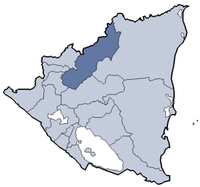Jinotega (department)
| Jinotega | |||
| Departamento of Jinotega, "Coffee capital" | |||
| Department of Nicaragua | |||
|
|||
| Country | Nicaragua | ||
|---|---|---|---|
| State | Jinotega | ||
| Region | Jinotega | ||
| City | Jinotega | ||
| Capital | Jinotega | ||
| Area | 9,755 km2 (3,766 sq mi) | ||
| Population | 417,372 (2014) | ||
| Timezone | UTC -6 | ||
| ISO 3166-2 | NI-JI | ||
| Website: http://www.jinotega.com/ | |||
Jinotega (Spanish pronunciation: [xinoˈteɣa]) is the second largest department in Nicaragua. It is located on the border with Honduras. Its provincial capital is the city of Jinotega, located in a valley 142 km from Managua (2h 26min, the Panamericana Norte and Guayacán).
The Department of Jinotega has a population of 417,372 inhabitants (2014). It produces 65% nationally Coffee , which is exported to: the United States, Russia, Canada, Asia, Australia and Europe. Many companies like Nestlé and Starbucks coffee, buy coffee from Nicaragua. Cocoa addition, basic grains, vegetables, fruits and flower cultivation occurs.
In the apartment is Lake Apanás with its own electricity. From the beginning Volcano Yalí The Cordillera Isabelia alignment with high mountains such as Chimborazo (1,688 meters), the Datanlí hill - El Diablo (1,550 m) with its waterfall "The Bujona". Penas Blancas Massif (1,700 meters) and the largest nature reserve in Central America: Bosawás Biosphere Reserve.
There are various restaurants and markets throughout the department of Jinotega, that serve various fruits, vegetables, meats, and drinks. The city of Jinotega is in the vicinity of the artificial Lake Apanas. A town named San Rafael del Norte is just 20 minutes away in a good paved road. San Rafael was the General Headquarters for the troops of General Sandino in the late 1920s and early 1930s. It has a nice church and small museum of Sandino and his wife Blanca Aráuz.
Museum: presentations of archeology, history and antiques. Library: to the front of the central park, in the same premises of the museum.
...
Wikipedia




